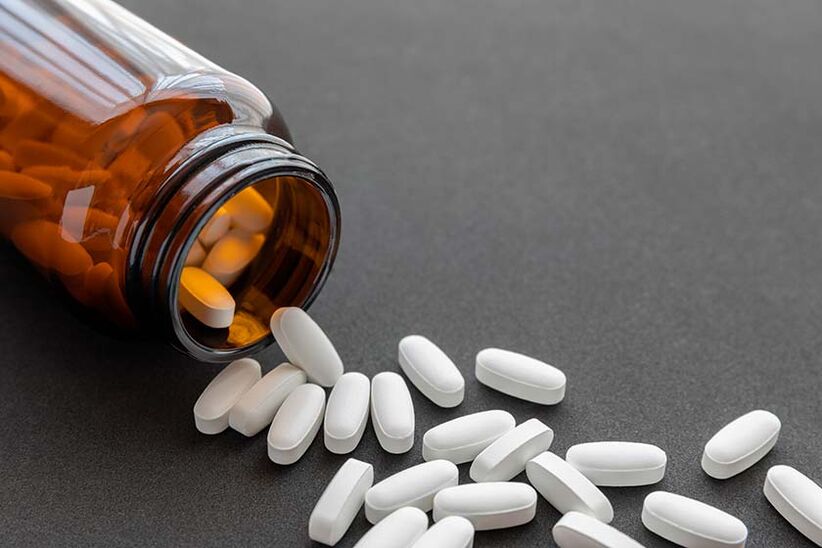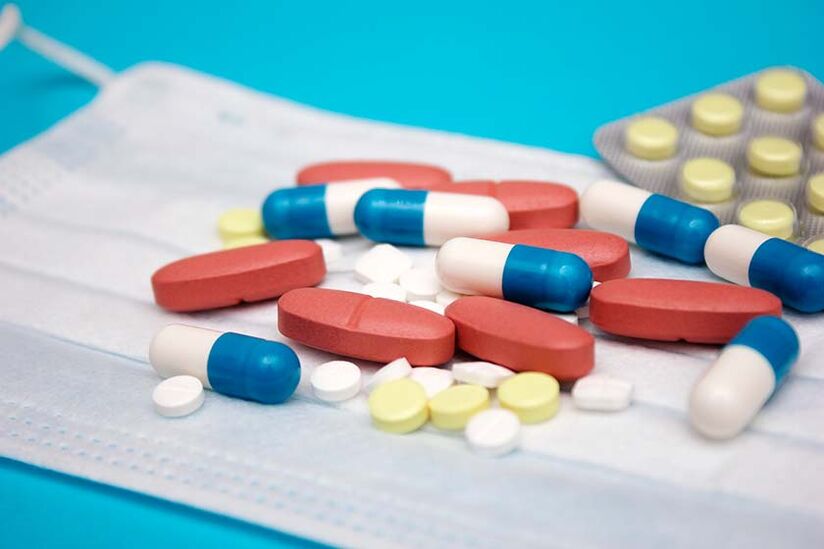Scientists disagree with whether alcohol is compatible with antibacterial drugs.Some experts suggest that taking alcohol after completing treatment does not lead to deterioration of health.There are more opponents of this approach among doctors.
Refusal of drinking during and after treatment: what specialist
The composition of antibacterial drugs includes synthetic substances that destroy virus microorganisms.They are prescribed when regular drugs are not useful.On the one hand, antibacterial drugs help cure people from very serious illnesses.On the other hand, the drugs of these groups have high toxicity.It is not without reason that doctors recommend drinking hepatoprotectors during treatment to hold the liver.
Alcohol after antibiotics significantly increases the burden on the body.Whether using alcohol during antibiotic treatment, the question is open.
Experts identify several reasons why you should refuse to drink during therapy:
- The level of alcohol effects take the drug.The active ingredient of antibiotics interacts with the protein of microorganisms, affecting them, changing the structure.Alcohol molecules modify the protein, weakening the chemical bond.
- The liver suffers from heavy burden during treatment with any medication.If someone drinks, he or she causes extra pressure for the body.As a result, toxic hepatitis develops, intrahepatic cholestasis, bile flow is difficult, the process of inflammation develops in the bile ducts and liver.
- Alcohol interactions with antibiotics can trigger significant deterioration in well -being.Reactions such as disulfiram are accompanied by fever, nausea, headache, in the worst case, they can cause coma and death.Medications of this group are used in the treatment of alcohol.
Alcoholic beverages contain ingredients that contribute to the absorption of drugs that are too fast in the intestines and they release it faster.
How long after an antibiotic trip can you drink alcohol?This term depends on the medication and duration of therapy.Some types of antifungal drugs, as well as penicillin, heliomycin are compatible with strong drinks in small doses.To avoid unpleasant consequences, it is advisable to leave them or consult a doctor.Combining alcohol and antibacterial drugs should be in extraordinary cases.
3-5 days after the antibiotics, doctors allow alcohol.This time it is enough for toxic substances to eliminate the body, and it can respond well to alcohol.If the patient has a chronic form of disease and repeatedly for the treatment of antibacterial medications, from taking alcohol, you should hold back for 2-4 weeks.

Alcohol after antibiotics: prospects and consequences
The opinion that absolute alcohol is not compatible with any of the drugs does not have clinically confirmed facts.This is a myth.There are separate types of therapy, where doctors recommend excluding alcohol.As a result of use is not necessarily fatal, but the prospect of developing possible complications.
The table below shows examples of negative reactions to alcohol from the body.Keep in mind that unpredictable situations can develop in response to taking "non -harmful" medications completely.To find out how much you can drink alcohol after antibiotics, you can have a doctor before taking the medication.
| The type of medication | A combination result with alcohol |
| Aspirin | Stomach ulcer |
| Caffeine, ephedrine. | A hypertension crisis |
| Diuretics, hypotensative. | A sharp decrease in pressure |
| Paracetamol | Toxic liver damage |
| Insulin, a drug that lowers sugar levels. | Dropped sugar in the blood, coma |
| Neuroleptic, painkillers, anti -inflammation | Poisoning. |
| Transquilizers, sleeping pills | Intoxicated, coma |
| Sulfamylamides | Lack of effect, intolerance to individual substances. |
| Niprolcerin, antihistamines | Allergies, an increase in pain |
The preparation of the cephocetane group slows down the chemical reaction of the alcohol molecule.As a result, one experiences all the signs of poisoning: dizziness, vomiting, headache, shortness of breath.Dismoder is a high content of anti -alcoholic components used in narcology to treat dependence.The least dose of alcohol is greatly improved.The minimum edge of the use of strong drinks is a week.
Another drug, less combined with alcohol - metronidozole.Alcohol after this antibiotic leads to intoxication.However, this judgment is not scientifically confirmed.In 2003, medical scientists conducted experiments.A small group of Finnish men were asked to drink alcohol regularly during treatment with Metronisol, and then shared the results.5 days after the start of taking antibiotics, there is no negative effect of alcohol.The organizer of the study emphasized that in order to avoid negative consequences, you cannot combine strong drinks with Metronidazole.
There are several other groups of drugs, which cannot be combined with alcohol:
- Tinedazole;
- Linezolide;
- Erythromycin;
- Sodium thiosulfate;
- Metadoxin;
- Cyanamide;
- Calcium carbimide;
- Disulfits;
- Lithium nicotinat;
- Naltrexon;
- Dimerkaprol;
- Nalmefen.
Doctors immediately warn patients about the dangers and consequences of combining antibacterial drugs with alcohol.
The question is, after how much alcohol possible after antibiotics are interested in many citizens.I want to use strong drinks without fear.This fear is not in vain.
The result of combining drinks with antibiotics:
- The transition of the disease to a chronic form.Microorganisms are resistant to certain substances, the effects of therapy disappear.The treatment process is delayed.
- Deterioration of blood clots.Increased freezing leads to the development of cardiovascular pathology.The risk of stroke or heart attack increases repeatedly.
- The appearance of allergic reactions.Light attacks are stopped by antihistamine drugs.In severe form, anaphylactic shock and Quincke edema develop.
Find out how much you can drink alcohol after antibiotics, you can, consult your doctor.
A compatible remedy
Doctors allow a strong combination of drinks with certain types of antibacterial drugs."Safe" Antibiotics List:
- Cephalosporins;
- Penicillin preparation;
- Macrolides.
A patient taking a penisilin medication should refrain from drinking 4-5 hours after the end of the course.Currently, the active ingredient of medicine and damage.Damage products are released through the excretion system.
A scientific approach
Researchers conducted a survey among the people of England.Of the 300 patients, the clinic more than 80% believed that the drink had a negative effect on the effects of the drug, 71% feared that the combination of such a combination.
In fact, the biggest danger lies in the formation of drug resistance.Microorganisms become resistant to non -systematic drugs.The patient, who was drunk, was afraid of the consequences, so he refused to continue treatment.
Why can't you drink alcohol during treatment with antibacterial drugs?The abuse of systematic beverages in combination with serious drugs can cause damage to the organ works to their refusal.Systematic beverages worsen immunity work, so the risk of developing various pathologies increases.

Body Recovery: Recommendations
How much time after taking alcohol is needed to recover after antibiotics?What is the deadline for breeding certain drugs, a doctor can say.Depending on the type of antibacterial drug, this period can be stretched for several days.An important criterion is the duration of the course.The longer the treatment, the more time it takes for recovery.
Doctors do not allow alcohol after antibiotics in some cases:
- The presence of a chronic disease in which the liver suffers to toxic burden.
- Simultaneously take another medicine.The recovery period in this case is postponed to 6 months.
Experts say: For complete body recovery after an antibiotic course, 1 year is required.Currently, one has increased the risk of cold, influenza, and more.
The intestines have a huge burden during the drug.Digestion is interrupted, metabolism slows down, vitamins are less absorbed, allergic reactions are exacerbated.
Experts agree that you can drink alcohol after antibiotics no earlier than a few weeks after cessation of therapy.In some cases, it is recommended to reduce the consumption of minimum drinking.
You can help your body normal by taking a probiotic course.They are rich in bifido and lactobacilli, vitamins, amino acids, enzymes.Probiotics drinks during or after the end of treatment for 2-3 weeks.
Product Benefits:
- reduction of toxic loads in the liver and kidneys;
- Strengthen immunity;
- recovery of intestinal microflora balance (local immunity);
- normalization of the digestive process;
- blocking toxins and allergens;
- Increase vitamin assimilation.
If it violates treatment with antibiotics, the risk of increased resistance.
Alcohol after antibiotics: After how long you can alcohol
Certain antibiotics time is individual.The blood system and vessels are released from aminoglycosides within 3 hours.Waste -The unlucky drugs located in the intra -uterine fluid leave the body after 2 weeks.The use of uncontrolled strong drinks before this period can cause absolute deafness.
If the drug is repeated, then the doctor recommends that you wait for the use of a strong drink.This applies to all groups of drugs.You cannot drink alcohol after antibiotics on the same day or within a few hours after treatment.
Drinks owned by the category of light alcohol (beer, wine) are allowed to drink 3-5 days after the end of treatment.With stronger alcohol, it should be delayed.Your doctor advises you to wait 10-12 days.The refusal to follow leads to negative consequences until the patient's death.























